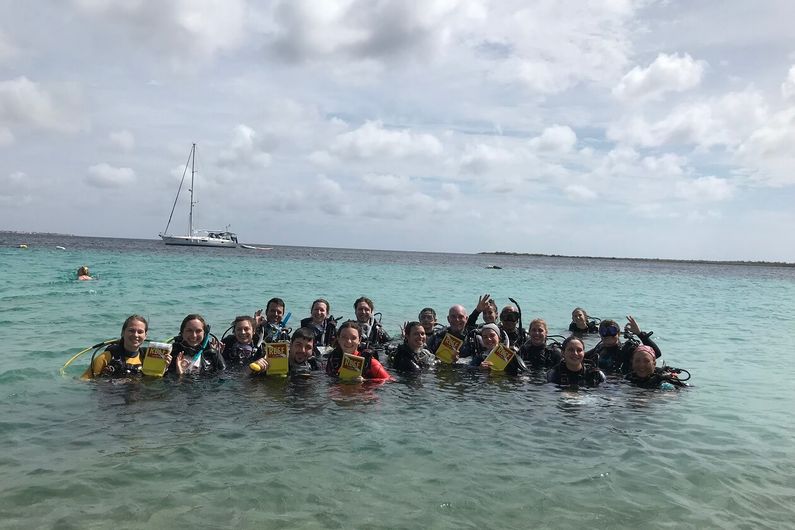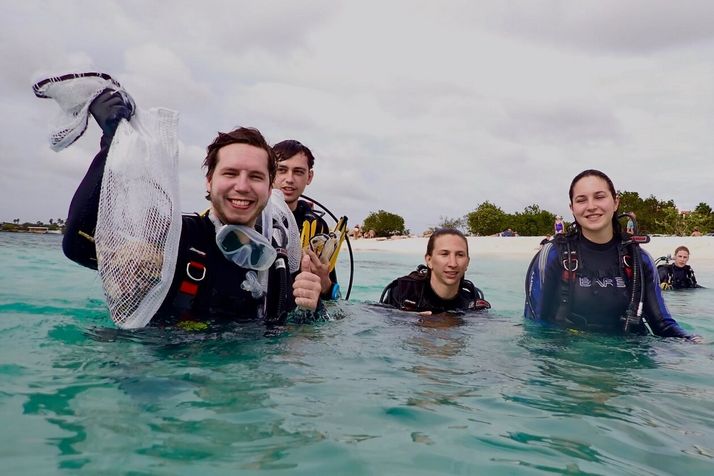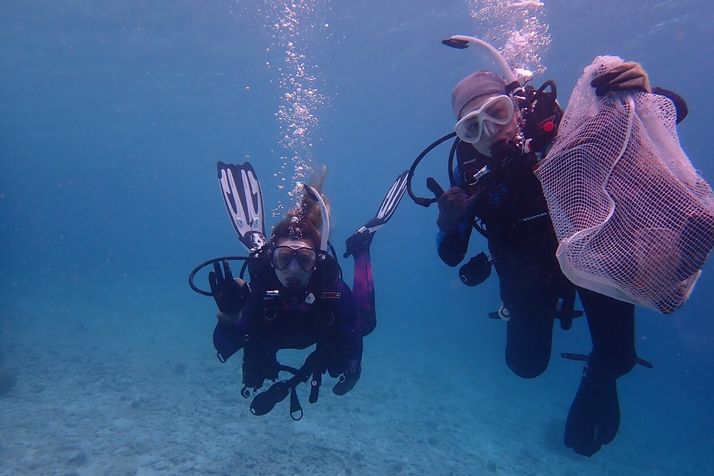Diving for the environment
- UdeMNouvelles
11/17/2022
- Andrée-Anne Legaré-Pepin
A scientific diving expedition off the coast of Bonaire gave students the chance to assess whether the ocean's health improved during the pandemic as human activity dropped.
A dozen students of Université de Montréal’s Faculty of Veterinary Medicine became certified divers to take part in a scientific diving expedition to the island of Bonaire, a Dutch special municipality located off the coast of Venezuela.
The group was trained by Michèle Doucet, an associate professor at the Department of Veterinary Biomedicine, who accompanied them on their ‘deep dive’ into applied research.
Together, they counted fish species to determine whether the slowdown in human activity over the two years of the COVID-19 pandemic had a positive impact on the island’s marine wildlife population and ecosystems.
Back in 2019, Bonaire welcomed one million visitors every three months. That figure fell drastically over the last two years, with only 1,500 visitors recorded every three months, but the island’s tourist numbers started going back up as of winter 2022.
Hard work and serious preparation
Diving expeditions require hard work and serious preparation. Leading up their expedition, the UdeM students received theoretical training as well as practical lessons in a swimming pool, including an introduction to diving safety. They also attended monthly team meetings before leaving for Bonaire.
Once on site, the young divers took part in morning meetings before doing practice dives to learn techniques for taking underwater inventory. One key thing they learned was how to use dive slates, so as to be able to take notes on any species or phenomena they encountered.
They finally put their months of learning into practice toward the end of their trip and were able to identify species very quickly. Having a large group of observers ensured data reliability: if many people reported seeing a species, chances were higher that it was actually present in the observation area.
Over 25 kilos of waste collected
The expedition gave students the opportunity to take concrete action to protect the environment. Aside from inventorying fish species, they gave back to the local community in Bonaire by spending an afternoon cleaning up the seabed as well as a popular beach on the island.
In total, over 25 kilograms of waste were collected from the water and recorded in the PADI AWARE database, and an additional 17 kilos collected from the shore for Mission 1000 tonnes.
“Every trip we take, I'm impressed by how much the students learn during the preparatory training and field work,” Doucet said.
“Whether the students are just starting their doctorate in veterinary medicine or about to finish it, scientific diving helps them develop their ability to communicate effectively, work as a team and cooperate with other disciplines—all skills that will serve them well as veterinarians, regardless of their speciality. Also, international experience improves their self-confidence, social engagement and leadership skills.”
“Making a real contribution to a scientific project abroad is a rewarding and unique experience for students,” added Bastien Rubin, a veterinary sciences masters student who took part in the Bonaire trip. “Since I've studied marine biology, the project instantly appealed to me and strengthened my conviction that I want to work in marine conservation.”
Bonaire an ideal location
With its high density and rich diversity of aquatic species, Bonaire was an ideal location for this expedition. Furthermore, the island is home to eight of the world's 10 densest and most diverse sites, according to Reef Environmental Education Foundation (REEF), a U.S. marine conservation organization and project partner.
Since the late 1970s, REEF has developed an impressive database with the help of recreational divers who took inventories of fish species in Bonaire. The data collected by the UdeM students will be compared with the REEF database. An analysis is currently underway, and the results will be the subject of a scientific article published sometime next year. Many of the project's participants will contribute to it.
A “one-health’ approach
Oceans and forests are the two main sources of the Earth's oxygen and are critical for maintaining the planet’s balance. Anything that affects the health of their ecosystems could also impact human health. This view is the cornerstone of the One Health approach, which the scientific diving expedition aimed to support by providing information on the need to regulate human activity along shorelines and in aquatic areas. By making human activity more sustainable, the goal is to help preserve the health of the oceans and, by extension, the planet.
A passion for scientific diving
Michèle Doucet is a professor of clinical pharmacology with a passion for scientific diving. She has spent several years sharing this zeal with students interested in studying environmental phenomena. As co-founder of the Regroupement en conservation et santé des écosystèmes aquatiques[EL1] , she led the faculty's first student diving expedition in the northern Sea of Cortez, off Mexico’s west coast, to study sea-star wasting disease in 2018. Next year, she will accompany another group of students enrolled in a veterinary scientific diving internship on a trip to Grenada, this time to study fish parasites.















